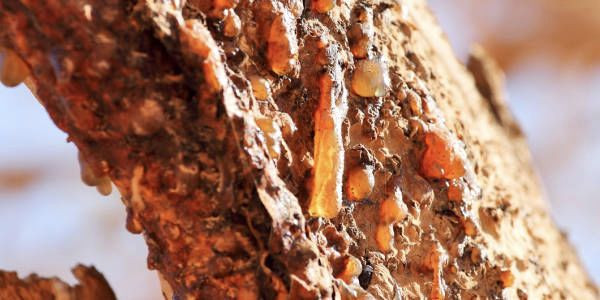Overview:
Myrrh comes from a shrub or tree that exudes a fragrant resin, which can be used to make perfumes and flavors. The myrrh mentioned in the Bible mostly refers to one species, but it may also include another species because they grow in the same area and look similar. These two trees are native to Arabia, Ethiopia, and the Somali coast of East Africa, and the resin they produce supplies most of the myrrh on the market. Both species are short and lush shrubs or small trees with thick, straight and thorny branches. They grow in rocky areas, especially on limestone mountains. The bark and wood of the tree have a strong fragrance. The trunk and branches will naturally ooze resin. The taste of the resin is bitter and a bit irritating. It is not delicious at all, but it was once valued by the medical community and used as a hemostatic drug. If mixed with wine and drunk, it can achieve the effect of relieving pain. Therefore, when Jesus was crucified, there is a record of "giving Jesus wine mixed with myrrh, but he did not accept it" (Mark 15:23). In the East, myrrh was revered as an aromatic substance, spice, and medicine. Ancient Egyptians burned myrrh in temples and used it to wrap corpses; Jews also used myrrh to anoint corpses. In the eyes of the Hebrews, myrrh was a precious spice.
What is Myrrh Essential Oil ?
Myrrh is a resin that comes from a gum-like substance that flows from the trunk of a tree called "Complexa". This tree is common in Africa and the Middle East. Myrrh is botanically related to frankincense and is one of the most widely used essential oils in the world.
To obtain myrrh, the trunk must be cut open to release the resin. When the resin dries, it looks like tears flowing from the trunk. The resin is then collected and myrrh essential oil is extracted from the resin through steam distillation.
Myrrh essential oil has a smoky, sweet, or bitter flavor. The word myrrh comes from the Arabic word "murr", which means bitter. The essential oil is yellow or orange in color and has a very high viscosity. It is often used as a base for perfumes and other fragrances.

Essential oil ingredients
There are two main active ingredients in myrrh, "terpenoids" and "sesquiterpenes" (in fact, the main component of myrrh is sesquiterpenes, accounting for 90%), which have anti-inflammatory and antioxidant effects. Sesquiterpenes specifically affect the emotional center of our hypothalamus, helping us stay calm and balanced. The anti-cancer and antibacterial properties of these two compounds and other potential therapeutic uses are being studied.
Application of essential oils
Skin effects:
It has strong bactericidal and disinfecting power, and can inhibit skin inflammation. It can treat acne and eczema. It can moisturize dry and chapped skin and is also effective for wrinkles. It has a slight cooling effect on the skin in hot and dry weather.
Body effects:
It has the effects of relaxing muscles and promoting blood circulation, removing blood stasis and relieving pain, and promoting muscle regeneration;
It has anti-fungal function and improves vaginitis caused by Candida. It can fight all reproductive and urinary system infections in women and is the best formula for treating gynecological infections.
It also has antibacterial, therapeutic and anti-inflammatory effects. Myrrh is very beneficial for treating gums and can quickly heal oral ulcers or gum problems. It is the main ingredient of many medicinal toothpastes and dental ointments, so when the gums are inflamed, add myrrh essential oil to water, stir it evenly with a glass rod and gargle.
After dilution, gently massage the stomach/abdomen in a clockwise direction to regulate the function of the digestive system, while regulating and stimulating the function of the stomach, and can also treat diarrhea.
Myrrh has similar effects to frankincense and is a good lung bactericide. Both can treat chest infections, nasopharyngeal mucosa inflammation, chronic bronchitis, colds and sore throats.
Mental effects:
Enhance brain vitality, restore physical and mental vitality, calm, clear the mind, and turn the tide.
Black Pepper Oil Extraction
Molecular Distillation Equipment Application
Oleoresins Introduction
Contact: Project Manager
Phone: +86-18120438367
Tel: +86-18120438367
Email: info@tycoretech.com
Add: No. 1, Optics Valley Avenue, East Lake New Technology Development Zone, Wuhan, Hubei, China
We chat
